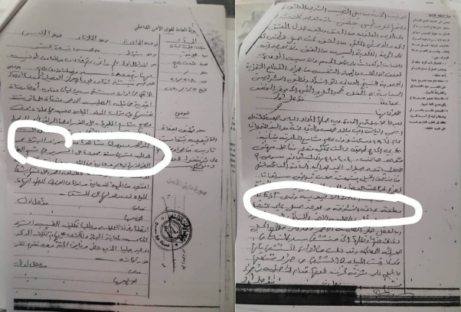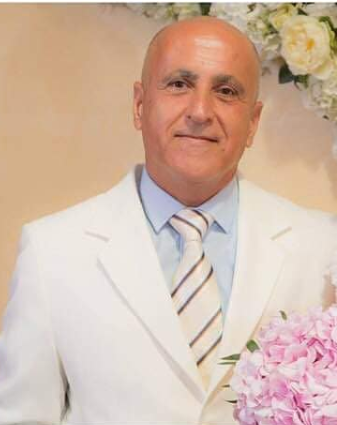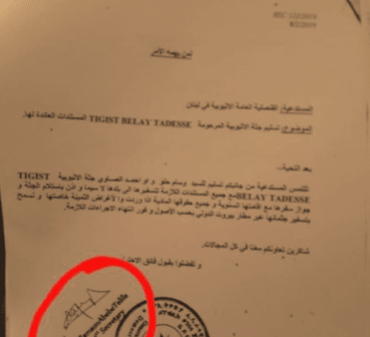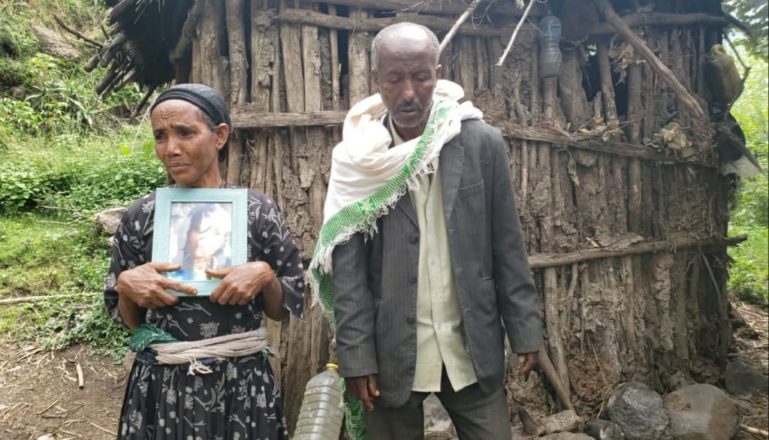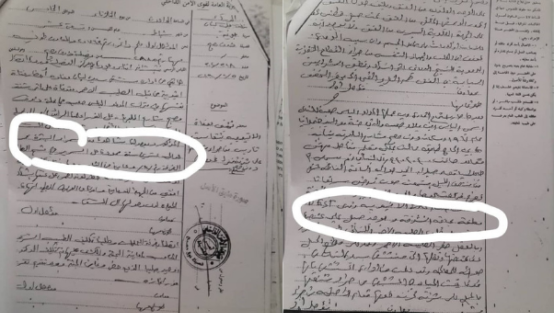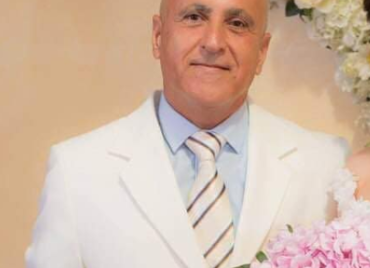THE VIDEO
Watch Abigail’s family plead for their sister’s body
THE STORY
RIP Abigail Avetiswin Akemi.
Abigail was recruited by Khalil George Badr and Aline Farah Badr, Lebanese citizens living in Ghana, to go and work for Khalil’s elderly mother in Lebanon. Abigail’s husband and family were reluctant to allow her to go to Lebanon but Aline persuaded the family by assuring them she would be well cared for. They were also reassured by the fact that Abigail’s cousin, Joyce, was already working in Lebanon for a friend of Aline’s. She and Joyce would therefore be able to see each other. Abigail bade her husband and 2 1/2 year old daughter goodbye and arrived in Lebanon on 30 May, 2019. Her agreed salary was $250 per month.
For the first 3 months, Abigail was paid. After that it appears she was not paid. Aline visited Lebanon in August but no visit between Joyce and Abigail was arranged; Aline was too busy. Joyce and Abigail were never to see each other in Lebanon except in the hospital shortly before Abigail died.
On 6 November, 2019, Abigail began to complain of severe headaches. Her madam told her it was the change in weather and advised her to drink water every hour. Abigail was eventually given paracetamol. She said her head ached so much, she could not hold it up and she felt like her eyes were going to come out of her head. Her family said that while she was laying down suffering from pain and dizziness, her madam would call her lazy, shout at her and demand that she get up and work. Abigail was given nothing but paracetamol; she was not taken to a doctor. In an audio message to her sister, she said,
“I don’t know what is happening to me. I can’t go on.”
In late November, Aline was visiting Lebanon and took Abigail to Baabda Hospital where she was admitted. It was too late. She died on 28 December, 2018.
Abigail’s family report that Aline showed no sympathy in relaying the news of Abigail’s death. Furthermore, they said that Aline insisted they pay $4000 for the repatriation of the body or she would have Abigail buried in Lebanon. The family, of course, were unable to come up with such a sum. If they had that kind of money, Abigail would never have gone to Lebanon in the first place. They contacted This Is Lebanon for help. We phoned Aline on 31 December to ask what was happening with the body. She would not tell us, but Abigail’s family say that call resulted in Aline’s decision to send the body home.
Shortly after the body arrived in Ghana, the Bader family paid Abigail’s family an undisclosed amount. After that settlement, the family thanked This Is Lebanon for enabling them to receive Abigail’s body home.
However, the story raises many questions that still need answering. Why didn’t Abigail’s madam get her medical attention earlier? Why was she threatening to bury Abigail in Lebanon? Shouldn’t there be an insurance company payout to Abigail’s family? What was the cause of death? Why wasn’t Abigail paid for months? Why was Aline demanding $4000 from the family to send the body home?
Why? Because This Is Lebanon.
TAKE ACTION
We can’t do this alone. We need your help! Join us in this fight.
Contact the Abusers
Talk to Aline Farah Bader and Khalil George Bader and ask them to take responsibility for their actions.
Share the Story
Tell others about this. Join us in the fight to ensure that Aline and Bader are brought to justice.
Join Our Work
We need your help to continue our efforts in fighting for Abigail Avetiswin Akemi and others like her.
Get the Updates
Get the updates straight into your inbox so you don’t miss any part of the story.
القصة
لسلام لروح أبيغيل أفيتيسوين أكيمي.
قام خليل جورج بدر وألين فرح بدر، وهما مواطنان لبنانيان يعيشان في غانا، بتوظيف أبيغيل للعمل لدى والدة خليل المسنّة في لبنان. كان زوج أبيغيل وعائلتها مترددين في السماح لها بالذهاب إلى لبنان، لكن ألين أقنعت الأسرة من خلال طمأنتهم بأنهم سيعتنون بها جيداً. كما طمأنهم وجود جويس، ابنة عم أبيغيل، التي كانت تعمل أصلاً في لبنان لدى صديقة ألين. وبذلك ستتمكن هي وجويس من رؤية بعضهما البعض. ودّعت أبيغيل زوجها وابنتها البالغة من العمر عامين ونصف ووصلت إلى لبنان في 30 أيار 2019. وكان راتبها المتفق عليه 250 دولار في الشهر.
في الأشهر الثلاثة الأولى، حصلت أبيغيل على راتبها. أما بعد ذلك فيبدو أنها لم تقبض أي أجر. زارت ألين لبنان في آب ولكن لم يتم ترتيب زيارة بين جويس وأبيغيل؛ فقد كانت ألين مشغولة للغاية. ولم تلتق جويس وأبيغيل ببعضهما في لبنان أبداً إلا في المستشفى قبل وفاة أبيغيل بوقت قصير.
في 6 تشرين الثاني 2019، بدأت أبيغيل تشكو من صداع شديد. قالت لها سيدتها أنه بسبب تغير الطقس ونصحتها بشرب الماء كل ساعة. في النهاية كانت أبيغيل تُعطَى الباراسيتامول. قالت إن رأسها كان يؤلمها بشدة، ولم تستطع حتى رفعه وشعرت أن عينيها وكأنهما ستخرجان من رأسها. قالت عائلتها إنه حين تستلقي كانت تعاني من الألم والدوار، وكانت سيدتها تسميها كسولة وتصرخ في وجهها وتأمرها بالنهوض والعمل. لم يُقدّم إلى أبيغيل سوى الباراسيتامول؛ لم يتم اصطحابها إلى الطبيب. وقالت في رسالة صوتية لأختها:
“لا أعلم ما الذي يحدث لي. لا يمكنني الاستمرار”.
في أواخر تشرين الثاني، كانت ألين تزور لبنان فأخذت أبيغيل إلى مستشفى بعبدا وتم إدخالها هناك. لكن بعد فوات الأوان. فقد توفيت في 28 كانون الأول 2019.
تقول عائلة أبيغيل بأن ألين لم تُظهر أي تعاطف في نقل نبأ وفاة أبيغيل. علاوة على ذلك، قالوا أن ألين أصرّت على أن تدفع عائلة أبيغيل 4000 دولار لإعادة الجثمان إلى بلدها وإلا ستدفن أبيغيل في لبنان. بالطبع، لم تتمكن الأسرة من تأمين مبلغ كهذا. لو كان لديهم هذا المقدار من المال، لما ذهبت أبيغيل إلى لبنان أصلاً. اتصلوا بجمعية “هذا لبنان” طلباً للمساعدة. اتصلنا بألين في 31 كانون الأول لنسألها عن موضوع الرّفات، فلم تخبرنا، لكن عائلة أبيغيل قالت إن المكالمة أفضت إلى قرار ألين بإرسال الجثمان إلى الوطن. بعد وصول الجثمان إلى غانا، دفعت عائلة بادر لعائلة أبيجيل مبلغاً غير معلن عنه. بعد تلك التسوية، شكرت العائلة “هذا لبنان” لمساعدتهم في استلام رُفات أبيغيل.
ومع ذلك، تثير القصة العديد من الأسئلة التي لا تزال بحاجة إلى إجابة. لماذا لم تؤمّن سيدة أبيغيل لها الرعاية الطبية في وقت أبكر؟ لماذا كانت تهدّد بدفن أبيغيل في لبنان؟ ألا ينبغي أن تكون هناك شركة تأمين تدفع تعويضات لعائلة أبيغيل؟ ما هو سبب الوفاة؟ لماذا لم تتقاضَ أبيغيل أجراً مدة أشهر؟ لماذا كانت ألين تطالب عائلة أبيغيل بـ 4000 دولار لإرسال الجثمان إلى بلدها؟
لماذا؟ لأنه هكذا هو لبنان.
THE STORY
Tigist Belay Tadesse worked in the home of a family in Jounieh, a city just north of Beirut. She died on 2 February, 2019. Her death was widely reported as a suicide. She was only 19.
Tigist hailed from North Wollo, a zone in the Amhara region of Ethiopia. She left her home to follow in the paths of family members who were already in the Middle East and sending remittances home. But Tigist never made it home. Her family refuses to accept the official explanation for her death.
Her brother, Amare Belay, says that Tigist was regularly beaten and abused by her employers. He personally believes that his sister was murdered. “At first things were ok. I spoke to her regularly and she told me she was getting by,” Amare explains, “but then they [her employers] started withholding her pay. When she asked her employers about her salary, they would beat her.”Amare says he last heard from his sister on 31 January 2019 when he says Tigist, terrified, told him she feared for her life.
“Tigist told me, ‘They are going to kill me. I don’t think I’ll make it out of here alive.’” – Amare
I tried to comfort her, told her to stop saying this,” Amare said between bouts of sobbing.“Three days later, I heard that she was dead.”
Tigist was often deprived of a means of communication with the outside world, but once in a blue moon she would get to speak to her brother, and she would share with him, under her breath, about the horrific abuses meted out against her, by Elias but in particular, by his son Wael Saab. Wael was, according to Tigist’s brother, a desensitized being who took pleasure in her misery.
Wael Saab is Elias’ only son. He’d kick, spit at her and demean her. His misogynistic traits are common with those of abusive Lebanese men who feel a need to take out their personal frustrations on the defenseless girl just trying to earn a living in their home.
Leda would turn a blind eye to her brother’s cruelties. Tigist’s being injured, including according to her brother, punches to the abdomen and face, didn’t merit any sort of intervention. Wael was given free reign to pummel a teenaged girl.
I tried to comfort her, told her to stop saying this,” Amare said between bouts of sobbing.“Three days later, I heard that she was dead.”
Tigist’s older sister, Emebet Belay, would reach out to Leda Sa’ab on WhatsApp when she wanted to see how her little sister was doing. Leda sometimes responded by putting her through to Tigist and the sisters would converse briefly. Then one day, hearing disturbing news and fearing the worst, Emebet Belay frantically contacted Leda for information about the well-being of her younger sister. But Leda replied to her with a voice message on Whatsapp that an Addis Standard journalist confirmed came from a device registered to Leda’s name. In a cold, hostile tone lacking any sympathy, Leda responded to Emebet one last time.
“Don’t call this number again,” Leda begins by warning her. “We cared for Tigist and treated her like family. She suddenly decided to drink a cleaning agent and kill herself. This is not our problem. Don’t call us again.”
After sending this message, Leda blocked Emebet on WhatsApp.
But Emebet doesn’t buy this explanation. She is adamant that her little sister didn’t commit suicide. “They murdered her. My sister had her whole life ahead of her and family to go home to. She had no reason to want to end her life,” she said.
Emebet says that things at the Sa’ab home had initially started well for Tigist. She was paid on time and cared for Elias’ ex-wife, who suffers from cancer. Some time into her employment in the home, both Elias and his son began physically abusing Tigist, Emebet says. Tigist relayed her plight under her breath, in her native Amharic during the rare phone conversation she would be permitted to have with her siblings.
“Tigist told me that the son used to kick her in the abdomen and insult her. The father was abusive too. I told her to try to find a new employer,” Emebet said.
Emebet further explained that things deteriorated when one day, Tigist was given the phone to call her sister but instead called her recruitment agency to complain of abuse at the hands of the Sa’ab family.
“This happened around September [2018],” Emebet recalls. “After they found that out, things worsened. We heard from her less and less. She lost her phone privileges. I believe the abuse got worse and worse. They also stopped paying her. Then suddenly I received the voice message saying that she had poisoned herself.”
Tigist didn’t receive a penny in salary for the final three months. This Is Lebanon affiliated activists obtained the Lebanese police report into Tigist’s death. The report, which is in Arabic, highlights numerous inconsistencies and Leda’s father Elias Milad Sa’ab, who was interviewed by police, makes several contradictory statements.
He gave investigators a fake phone number and refused to identify his place of employment. When asked about Tigist’s death, he initially told the police that she had hung herself in her bedroom. But in the same interview some time later, he states that he found Tigist hanging from the balcony.
Both statements contradict what his daughter Leda told Tigist’s family when she sent the audio message claiming Tigist had poisoned herself. This is documented proof of family members giving various contradictory versions of Tigist’s death.
An autopsy report later conducted at Addis Ababa’s St. Paul’s Hospital confirms that Tigist had a neck wound, suggesting that she died after blood circulation was cut off to her head, but stopped short of declaring a cause of death.
Sections of the Lebanese police report into the death of Ethiopian citizen Tigist Belay Tadesse. These pages include statements given by Elias Milad Sa’ab during his questioning by police. Encircled in white, two separate segments of the same document showing that he made conflicting statements about where Tigist’s body was found.
Addis Standard contacted Leda Sa’ab to inquire as to what pushed her to send the audio recording in which she notified Emebet of her younger sister’s death. Both the coroner’s report and an autopsy made no mention of a poisoning, but in the recording, Leda affirmed this was the cause of Tigist’s alleged suicide. Leda’s allegation was made prior to her father telling Lebanese police that Tigist had actually hung herself.
Leda was reached by phone via an undercover collaborator. Leda Sa’ab was briefly questioned about the Ethiopian maid who used to work in her home. She appeared startled that someone would call her about Tigist. “We don’t have any Ethiopian woman working in our home,” she initially spurted out.
Addis Standard: Yes, I know there’s no one now, but previously there had been one who passed away in February, yes?
Leda Sa’ab: Yes and what about her?
Addis Standard: We are in possession of an audio clip in which you are heard telling her sister Emebet that she died after consuming poison…
Leda Sa’ab: Yes, she is dead, but I don’t know how she died. Stop talking to me now.
Leda abruptly hung up the phone at this point. Five months after telling Emebet Belay that her sister had drunk a chemical to end her life, she changed her story and said that she had no idea how her death occurred. Five months after her father told investigators that Tigist had hung herself, Leda feigned total ignorance about the tragedy.
Perhaps in an attempt to further confuse investigators, Leda gave the journalist the name of her uncle, Milad Sa’ab as being her father’s. It is believed that this was part of an attempt to exonerate or minimize the involvement of her father, Elias. When Milad was contacted and asked to clarify who he was in a series of text messages, he refused to respond and began blocking the numbers of those making inquiries.
Elias Milad Sa’ab also wouldn’t respond to attempts to reach him.
Addis Standard contacted Leda Sa’ab to inquire as to what pushed her to send the audio recording in which she notified Emebet of her younger sister’s death. Both the coroner’s report and an autopsy made no mention of a poisoning, but in the recording, Leda affirmed this was the cause of Tigist’s alleged suicide. Leda’s allegation was made prior to her father telling Lebanese police that Tigist had actually hung herself.
Nobody at the Ethiopian consulate in Beirut found it necessary to investigate the case. Ethiopian diplomats simply shipped the body off to Ethiopia and didn’t even bother to file a complaint with police and demand a criminal probe despite evidence pointing to the Saab family having carried out a murder.
A document revealed pinpointed an Ethiopian diplomat named Samson Abebe Telila as being responsible for the coverup and eventual inaction of the Ethiopian consulate.
When asked, Samson confirmed the document’s veracity. He refused to refer to Tigist by name, something consular staff in Beirut have long been accused of, dehumanizing their fallen fellow citizens.
He simply replied that it wasn’t his job to care about justice for domestic workers who die at the hands of their employers in Lebanon.
Such conduct, by those hired to safeguard the dignity of Ethiopians in Lebanon, contributes to the rise in cases of dead Ethiopian domestic workers in Lebanon.
Instead of being dismissed from his post, Samson remains employed as a First Secretary at the Ethiopian consulate.
It is the many inconsistencies that point to the Sa’ab family hiding important details that could potentially incriminate them in the 19 year old Ethiopian’s death. If anything, a court case could commence based solely on the fact that Tigist had toiled endlessly for every single day between November 2018 and January 2019 and received no financial compensation for it.
But who in Lebanon would investigate the death of a migrant domestic worker? And when has an abusive employer ever been brought to justice?
Emebet, the sister of Tigist Belay Tadesse, said “As a family, our conscience won’t rest as we know there is no way Tigist would have killed herself. I won’t accept what they are telling us. I also know that God won’t let my sister’s murder go unpunished.”
Tigist’s family mourns the loss of their daughter.
It appears that divine authority is the only kind that Emebet and her family can call upon.
The People
“Tigist told me, ‘They are going to kill me. I don’t think I’ll make it out of here alive.’” – Amare
TAKE ACTION
We can’t do this alone. We need your help! Join us in this fight.
Contact the Abusers
Talk to the the Samson and the Sa’ab family and ask them to send monies to Tigist’s family for their pain and suffering.
Share the Story
Tell others about this. Join us in the fight to ensure that the Sa’ab family are brought to justice.
Join Our Work
We need your help to continue our efforts in fighting for Tigist and others like her.
Get the Updates
Get the updates straight into your inbox so you don’t miss any part of the story.
القصة
عملت تيجيست بيلاي تاديس في منزل عائلة في جونيه، وهي مدينة تقع شمال بيروت مباشرة. توفيت في 2 شباط 2019. و لقد أفادت العديد من التقارير أن وفاتها كانت انتحاراً. كانت تبلغ من العمر 19 ربيعاً.
جاءت تيجيست من شمال “وولو”، وهي منطقة في إقليم “أمهارا” ،إثيوبيا. غادرت وطنها لتسير على خُطى أفراد عائلتها الذين كانوا بالفعل في الشرق الأوسط و يحوّلون الأموال إلى ديارهم. لكن تيجيست لم تعُد أبداً إلى الوطن. و ترفض عائلتها قبول البيان الرسمي لسبب وفاتها.
يقول شقيقها، أماري بيلاي، أن تيجيست كانت تتعرض للضرب و التعنيف باستمرار من أصحاب عملها. و يعتقد شخصياً أن أخته قد قُتِلت. و يوضح قائلاً: «في البداية كانت الأمور على ما يرام. كنت دائماً أتحدث إليها وأخبرتني بأنها تتدبر أمرها، ولكن بعد ذلك امتنع (أصحاب عملها) عن دفع راتبها. و عندما كانت تسأل أصحاب عملها عن راتبها، كانوا يضربونها». يقول أماري أنه سمع أخبار أخته آخر مرة في 31 كانون الثاني 2019 عندما أخبرته تيجيست أنها تخشى على حياتها، وهي مرتعدة من الخوف.
“قالتْ لي: سيقتلونني. لا أعتقد أنني سأخرج من هنا على قيد الحياة.” – أماري
حاولتُ أن أخفف عنها طالباً منها التوقف عن قول ذلك. و بعد ثلاثة أيام سمعت أنها ماتت.
غالباً ما حُرمت تيجيست من وسيلة الاتصال بالعالم الخارجي، ولكن كانت تتحدث إلى شقيقها قلّما ندر، وتشاركه، بصوت مكتوم، الانتهاكات المروعة التي تعرضتْ لها من الياس، وعلى وجه الخصوص، من ابنه وائل صعب. كان وائل، بالنسبة لشقيق تيجيست، مخلوقاً عديم الإحساس يستمتع ببؤسها و شقائها.
وائل صعب هو ابن الياس الوحيد. كان يركلها ويبصق عليها ويحقّرها. إن كراهيته للنساء شائعة لدى أولئك الرجال اللبنانيين المعنفين الذين يشعرون بالحاجة إلى التخلص من إحباطاتهم الشخصية برميها على فتاة لا حول لها و لا قوة، تحاول مجرّد كسب لقمة العيش في منزلهم.
كانت ليدا تغض الطّرْف عن قسوة شقيقها. إن إصابات تيجيست، حتى بالنسبة لشقيقها، جرّاء اللّكمات على البطن والوجه، لم تكن تستحق أي نوع من التدخل. لقد أُعطِي لوائل سيادةً مطلقة لضرب فتاة مراهقة.
كانت أخت تيجيست الكبرى، إيميبِت بيلاي، تتواصل مع ليدا صعب على الواتساب كلما أرادت أن تطمئن عن أختها الصغيرة. فتصلها ليدا أحياناً مع تيجيست و تتحدث الأختان لفترة وجيزة. ثم ذات يوم، إذ سمعت أخباراً مثيرة للقلق، وخوفاً من الأسوأ، اتصلت إيميبِيت بيلاي بلهفة ب ليدا للإطمئنان على سلامة أختها الصغرى. لكن ليدا ردت عليها برسالة صوتية على الواتساب، أكد الصحافي من “أديس ستاندرد” أنها صادرة من جهاز مسجل باسمها. و بلهجة باردة وعدائية تفتقر إلى أي تعاطف، ردت ليدا على إيميبِيت لآخر مرة.
بدأت بتحذيرها: «لا تتصلي بهذا الرقم مرة أخرى. لقد اعتنينا ب تيجيست وعاملناها كأحد أفراد العائلة. و فجأة قررت أن تشرب مادة منظّفة وتقتل نفسها. هذه ليست مشكلتنا. إياك أن تتصلي بنا مرة أخرى».
بعد إرسال هذه التسجيل الصوتي، حظرت ليدا إيميبِيت على الواتساب..
لكن إميبيت لا تصدق هذا التفسير. وتصرّ على أن أختها الصغيرة لم تنتحر. قالت: « لقد قتلوها. كانت أختي شابة في مقتبل العمر، وعندها عائلتها لترجع إليها. لم يكن لديها سبب لترغب في إنهاء حياتها».
تقول إيمبيت بدأت الأمور أولا في منزل عائلة صعب على نحو جيد ل تيجيست. استلمت راتبها في الوقت المحدد و كانت ترعى زوجة الياس السابقة التي تعاني من السرطان. وتقول إيميبيت أنه بدأ كلٌ من الياس وابنه بتعنيف تيجيست جسدياً في وقت ما أثناء عملها في المنزل. كانت تيجيست تشكو محنتها بأنفاس مكتومة، بلغتها الأم الأمهرية في المحادثة الهاتفية النادرة التي كان يُسمح لها بها مع أشقائها.
و هذا ما قالته إيميبيت: «أخبرتني أن الابن كان يركلها في بطنها و يشتمها. كان الأب يقوم بتعنيفها أيضاً. قلت لها أن تحاول العثور على صاحب عمل جديد».
كما أوضحت إيميبيت أن الأمور تدهورت عندما أُعطِيت تيجيست في أحد الأيام هاتفاً للاتصال بأختها، وبدلاً من ذلك اتصلت بوكالة التوظيف لتشتكي من العنف الذي تتعرض له من عائلة صعب. تتذكر إيميبيت قائلة: «حدث هذا في شهر أيلول 2018 تقريباً. و بعد أن اكتشفوا ذلك، ساءت الأمور. خفت إتصالاتها بالتدريج. خسرت امتيازاتها الهاتفية المعتادة. أعتقد أن التعنيف ازداد سوءاً. كما توقفوا عن دفع راتبها. ثم فجأة تلقيت رسالة صوتية تقول بأنها قد سمّمت نفسها».
على الرغم من العمل بلا انقطاع خلال الأشهر الستة الأخيرة من حياتها، لم تحصل تيجيست على فلس واحد من راتب الأشهر الثلاثة الأخيرة. حصل ناشطون من جمعية “هذا لبنان” على تقرير الشرطة اللبنانية عن وفاة تيجيست. يسلط التقريرباللغة العربية، الضوء على العديد من التناقضات، و أدلى والد ليدا، الياس ميلاد صعب، الذي تم استجوابه من قبل الشرطة، بعدة تصريحات متناقضة.
لقد أعطى المحققين رقم هاتف مزيف ورفض تحديد مكان عمله. و عندما سُئِل عن وفاة تيجيست، أخبر الشرطة في البداية أن الشابة شنقت نفسها في غرفة نومها. ولكن لاحقاً في المقابلة نفسها، ذكر أنه وجد تيجيست مشنوقة تتدلّى من الشرفة. يتعارض كلا التصريحين مع ما أخبرته ابنته ليدا لعائلة تيجيست عندما أرسلت رسالة صوتية تدّعي فيها أن تيجيست قد سمّمت نفسها. و هذا دليل موثَّق على قيام أفراد العائلة بإخبار روايات متناقضة عن وفاة تيجيست. يؤكد تقرير تشريح الجثة الذي تم إجراؤه لاحقاً في مستشفى سانت بول في أديس أبابا، أن تيجيست قد أصيبت بجرح في الرقبة، مما يشير إلى أنها توفيت بعد قطع الدورة الدموية عن رأسها. إلا أن التقرير جاء مقصّراً في إعلان سبب الوفاة.
تقارير أقسام من الشرطة اللبنانية عن وفاة المواطن الإثيوبي تيغيست بيلاي تاديسي. تتضمن هذه الصفحات تصريحات أدلى بها إلياس ميلاد صعب أثناء استجوابه من قبل الشرطة. محاطة باللون الأبيض ، مقطعين منفصلين من نفس المستند يوضحان أنه أدلى ببيانات متضاربة حول مكان العثور على جثة تيجست.
اتصلت جريدة “أديس ستاندرد” بليدا صعب للاستفسار عما دفعها لإرسال التسجيل الصوتي الذي أبلغت فيه إيميبيت بوفاة شقيقتها الصغرى. إذ لم تتم الإشارة إلى التسمم في أيّ من تقرير الطبيب الشرعي أو تشريح الجثة، إنما في التسجيل الصوتي، أكدت ليدا أن هذا كان سبب انتحار تيجيست المزعوم. جاءت مزاعم ليدا قبل أن يخبر والدها الشرطة اللبنانية أن تيجيست قد شنقت نفسها بالفعل
تم الاتصال بـ ليدا عبر الهاتف من قِبل متعاون سري، و استجوابها لفترة وجيزة بما يخص الخادمة الإثيوبية التي كانت تعمل في منزلها. بدت مذعورة من أن يتصل بها شخص ما بشأن تيجيست. فاندفعت بالرد في البداية:« ليس لدينا أية امرأة إثيوبية تعمل في منزلنا».و إليكم مقتطفات من المكالمة.
أديس ستاندرد: نعم ، أعلم أنه لا يوجد أحد الآن، ولكن في السابق كان هناك واحدة توفيت في شباط، أليس كذلك؟
ليدا صعب: نعم وماذا عنها؟
أديس ستاندرد: لدينا مقطع صوتي نسمعكِ فيه تخبرين أختها إيميبيت أنها ماتت بعد تناولها السم.
ليدا صعب: نعم، لقد ماتت، لكني لا أعرف كيف ماتت. توقف عن التحدث إلي الآن.
فجأة أقفلت ليدا الهاتف عند هذا الحد. بعد خمسة أشهر من إخبار إيميبِيت بيلاي أن أختها قد شربت مادة كيميائية لإنهاء حياتها، غيرت قصتها وقالت إنها لا تعرف كيف حدثت وفاتها. بعد خمسة أشهر من إبلاغ والدها للمحققين أن تيجيست قد شنقت نفسها، تظاهرت ليدا بجهلها التام بالمأساة.
ربما في محاولة لإرباك المحققين أكثر، أعطت ليدا اسمَ عمّها “ميلاد صعب” للصحفي على أنه والدها. ويُعتقَد أن هذا كان جزءاً من محاولة تبرئة والدها الياس أو التخفيف من تورطه. عندما تم الاتصال بميلاد وطُلِب منه أن يوضح من يكون في سلسلة من الرسائل النصية، رفض الرد وبدأ يحجب أرقام الذين يقومون بالاستفسارات.
كما لم يستجب الياس ميلاد صعب لمحاولات الوصول إليه.
ولم يكن هناك أحد في القنصلية الإثيوبية في بيروت يرى ضرورة التحقيق في القضية. فقد اكتفى دبلوماسيون إثيوبيون بشحن الجثة إلى إثيوبيا ولم يكلّفوا أنفسهم عناء تقديم شكوى إلى الشرطة والمطالبة بإجراء تحقيق جنائي على الرغم من الأدلة التي تشير إلى قيام عائلة صعب بارتكاب جريمة قتل.
قد حددت إحدى الوثائق المبيّنة دبلوماسياً بدقة إثيوبياً يدعى سامسون أبيبي تيليلا بأنه مسؤول عن التستر و التقاعس الفعلي للقنصلية الإثيوبية.
وعندما سُئِل، أكد سامسون صحة الوثيقة. ورفض الإشارة إلى تيجيست بالاسم، وهو أمر يُتُّهم به موظفو القنصلية في بيروت منذ فترة طويلة، تجريد إخوتهم المواطنين المتوفّين من الإنسانية.
أجاب ببساطة أنه ليس من وظيفته الاهتمام بتحقيق العدالة لعاملات المنازل اللواتي تلقَيْن حتفهنّ على أيدي أصحاب عملهن في لبنان.
إن مثل هذا السلوك، من قبل أولئك الذين تم تعيينهم للحفاظ على كرامة الإثيوبيين في لبنان، يساهم في ازدياد حالات وفيّات عاملات المنازل الإثيوبيات في لبنان.
و بدلاً من عزله من منصبه، لا يزال سامسون يعمل سكرتيراً أولاً في القنصلية الإثيوبية.
إن التناقضات الكثيرة التي تشير إلى إخفاء عائلة صعب تفاصيل مهمة، يمكنها أن تجرّمهم في وفاة الإثيوبية ذات التسعة عشر عاماً. إذا كان هناك أي شيء للقيام به، يمكن أن تُرفع دعوى قضائية مبنيّة فقط على حقيقة أن تيجيست قد كدحت بلا انقطاع على مدى الأيام الواقعة بين تشرين الثاني 2018 وكانون الثاني 2019 بدون أن تتلقى أي تعويض مالي عنها.
لكن من الذي في لبنان سيحقق في وفاة عاملة منزل مهاجرة؟ ومتى تم تقديم صاحب عمل استغلالي للعدالة؟
إيميبيت، شقيقة تيجيست بيلاي تاديس: « إننا كعائلة، لن يرتاح ضميرنا لأننا نعلم أنه و لا بأية حال كانت تيجيست لتقتل نفسها. لن أقبل بما يقولونه لنا. و أعلم أيضاً أن الله لن يدع مقتل أختي يمرّ من دون عقاب».
أسرة تيجست حزينة على فقدان ابنتهم.
يبدو أن السلطان الإلهي هو الوحيد الذي تستطيع إيميبيت وعائلتها التضرع إليه.






